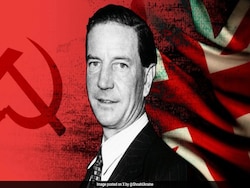The Mole in MI6: How a Cambridge Spy Fooled British Intelligence for Decades
In a stunning display of deception, one of Britain’s most trusted intelligence officers managed to conceal his allegiance to the Soviet Union for over three decades. Harold Adrian Russell “Kim” Philby, a polished gentleman with impeccable manners, had skillfully infiltrated the highest ranks of the United Kingdom’s renowned intelligence agency, MI6, all the while feeding vital information to the KGB.
Born in 1912 to a family of privilege, Philby’s early life was marked by a privileged upbringing and an education at the prestigious Cambridge University. It was during his time at the renowned institution that he was recruited by the Soviets, his sharp intellect and impressive social skills making him the perfect candidate for their long-term espionage operation.
Philby’s rise through the ranks of MI6 was meteoric, and he quickly became a trusted confidant of the organization’s leadership. His charm and diplomatic finesse allowed him to navigate the intricate web of British intelligence, all the while carefully selecting and passing on information that would aid the Soviet Union’s efforts.
The extent of Philby’s betrayal became increasingly apparent as the decades passed. He was privy to some of the most sensitive intelligence operations, including the planning of the ill-fated 1956 Suez Crisis and the attempted coup against Fidel Castro in Cuba. Each time, Philby ensured that the Soviets were one step ahead, frustrating British and American efforts to maintain strategic advantage.
It was not until the early 1960s that Philby’s duplicity began to unravel. Suspicions were raised when several of his fellow spies were uncovered, and the pressure mounted as the investigation closed in. Realizing that his cover was about to be blown, Philby fled to the Soviet Union in 1963, where he was welcomed as a hero and lived out the remainder of his days.
The Philby case remains one of the most notorious and damaging espionage scandals in British history. His ability to conceal his true allegiance for so long, and the damage he inflicted on his country’s security, has become the stuff of legend. The legacy of the “Gentleman Spy” serves as a stark reminder of the importance of vigilance and the need to carefully vet those entrusted with the nation’s most sensitive information.



